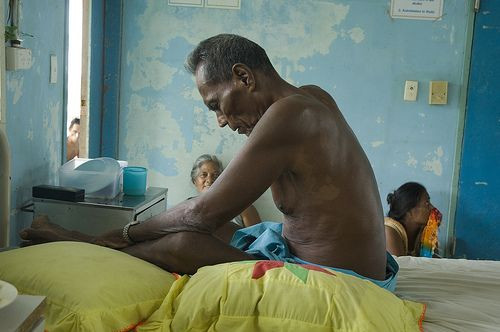WHO Warns Of Possibly Devastating Tuberculosis Epidemic Due To Drug-Resistant Strain

Although it may seem like the plot of a summer Hollywood blockbuster, The World Health Organization (WHO) has announced the existence of a super strain of TB which is completely resistant to any medication. In a Reuters article, the WHO explains how poor global diagnosis and treatment of the original TB strain allowed for the new strain to evolve and spread rapidly. Now the WHO is working to come up with a solution to this problem before it gets too out of control.
Tuberculosis (TB) is a communicable disease that typically targets the lungs. It can spread through bacteria released into the air through another person’s sneeze or cough. Symptoms of TB include low-grade fever, constant cough, night sweats, and unintentional weight loss. Factors that put you most at risk for contracting the disease are: having a compromised immune system, living in overcrowded and poorly ventilated housing, working in a health care or refugee camp, or traveling to an area where TB is more common.
In 2012, half a million people were infected with the drug resistant TB, also known as MDR-TB (multi-drug resistant-TN). However, it is estimated that less than a quarter of the actual cases were properly diagnosed. The WHO has now classified MDR-TB as a global health security risk and estimate that as many as five million people will be infected with it by 2015.
Traditionally it has been difficult to diagnosis TB. Many times the symptoms are brushed off as another ailment, and those infected either wrongly medicate or go untreated. For people who are tested for TB, the results can take up to two months to come through. In this gap between infection and diagnosis, the person is able to further spread the bacterial infection. Earlier diagnostic and treatment of the disease is very important. “It improves the chances of people getting the right treatment and being cured, and it stops spread of drug-resistant disease,” WHO director general Margaret Chan recently informed the public.
WHO is taking serious action to try and control MDR-TB. New tests have been developed that are able to diagnosis TB much quicker. However, it is difficult to get the technology to areas of the globe which need it most. EXPAND-TB (Expanding Access to New Diagnostics for TB) is an international project created to help raise awareness of and fight against the TB superbug. Countries involved with the program have seen their numbers of diagnosed cases of TB tripled.
Mario Ravigione, director of WHO’s global TB program is confident that the EXPAND project will have dramatic global effects of the diagnosis of TB on an international level and could perhaps help us avoid the possible disaster. “Increased capacity and decreased prices mean that we can reach more people,” Ravigione said.
Source: Punnose AR, Lymn C, Golub RM. Tuberculosis. JAMA. 2013
Published by Medicaldaily.com



























